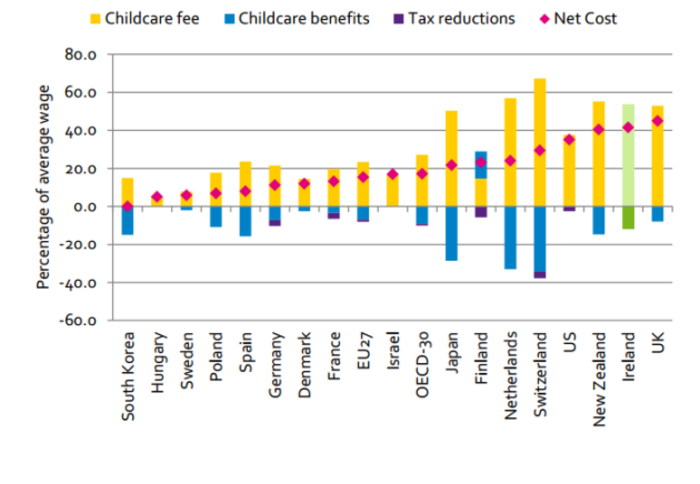The high cost of childcare is putting Irish people off working and hurting competitiveness
Ireland was ranked as the second most-expensive country in the OECD for childcare.
IRELAND’S HIGH CHILDCARE costs need to be addressed to help the country remain competitive with other countries in the fight for investment, according to a new study.
The National Competitiveness Council’s (NCC) annual report found that Ireland’s international competitiveness has improved in recent years, noting that Ireland rose from sixteenth to seventh in the latest World Competitiveness Yearbook.
The council said that said that this was due to several factors, including Ireland’s “improved fiscal position, strong economic, employment and productivity growth combined with cost competitiveness”.
However, the body warned that despite the economic recovery, Ireland’s outlook is still “precarious”.
It highlighted several key areas of concern which it said require immediate policy attention, one of which was “increasing labour market participation”.
The council said that Ireland need to “address (its) relatively low levels of labour force participation and realise the untapped potential available, particularly female participation, through addressing the interaction of labour market policies and supports, childcare costs and the costs of returning to work for individuals”.
Highest in OECD
It noted that for households with children, the additional costs associated with childcare “represent the largest additional cost associated with taking up either part-time or full-time employment”.
“Childcare costs in Ireland are the second highest and highest in the OECD for couples and lone parents respectively and are not offset, as in some other countries, by benefits in the form of subsidies (or) direct payments,” it said.
 Childcare costs as a percentage of wage by country for 2012
Childcare costs as a percentage of wage by country for 2012
The council singled out the high cost of childcare as a disincentive for people to return to the workforce and called it a “pressing concern”.
It also identified several measures that Ireland should take to ensure it remains competitive as a location for business and investment.
Other areas of concern
One of these is to put more money into infrastructure, with the council saying that a “step-up in investment” is needed in road, energy, water and broadband facilities.
It also said that Ireland needs to support the “internationalisation of Irish enterprise”.
“Developing new products, services and solutions for international expansion was never more important in the context of Brexit and the enhancing the competitiveness of our key clusters is critical, together with an ambitious external trade agenda,” it said.
Council chair Peter Clinch said that much of Ireland’s competitiveness improvement in recent years was a result of the economic downturn along with favourable exchange rates against sterling and the dollar.
“As the economy recovers, we are now seeing price pressures re-emerging and, at the same time, Brexit has resulted in a reversal of exchange rate trends, meaning Irish exports are now more expensive in the UK,” he said.
“It remains to be seen what overall impact the decision has on Ireland’s relationship with the UK, across a host of policy areas, from energy to investment and trade to migration.
“Ireland must be seen to respond in a forthright and confident fashion to the challenges posed by Brexit and position Ireland to take advantage of the opportunities which emerge as a result. Focusing on policies which enhance Ireland’s competitiveness is paramount in this regard.”






